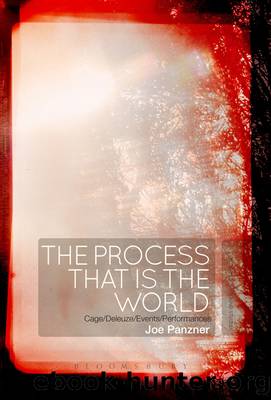The Process That Is the World: CageDeleuzeEventsPerformances by Joe Panzner

Author:Joe Panzner [Panzner, Joe]
Language: eng
Format: epub
Tags: Music, General, Genres & Styles, Electronic, History & Criticism, Recording & Reproduction
ISBN: 9781628925739
Google: pfCuCgAAQBAJ
Publisher: Bloomsbury
Published: 2015-12-17T20:51:19+00:00
5
âThrough Many a Perilous Situationâ (Performances)
What distinguishes the map from the tracing is that it is entirely oriented toward an experimentation in contact with the real ⦠A map has multiple entryways, as opposed to the tracing, which always comes back âto the same.â The map has to do with performance, whereas the tracing always involves an alleged âcompetence.â1
A Happening should be like a net to catch fish the nature of which one does not know. And at this point the word âdisciplineâ means what it originally meantânamely, giving up oneself in order, one could even say, to know oneself.2
How are we to judge a performance of Cageâs music when Cage has displaced most traditional criteria for the judgment of performance? In his indeterminate scores, there is rarely an order of resemblance between notation and sounding resultâmost scores require several degrees of translation and modification to render them performable. There are few ways to compare the fidelity of a performerâs actions to the instructions in the score, actions that are always bound to diverge from the performerâs intentions as complex situations unfold. There are occasional signposts provided in the compositions themselves (a gesture, notated pitches, timed reference points), but rarely a means of mapping a sonic object back upon any composed prefigurations. Cage insists that it is never sufficient to look for criteria of âcorrectnessâ or adequacyâthe very idea of correctness holds little appeal. âA âcorrect understandingâ doesnât interest me,â he asserts in For the Birds. âWith a music-process, there is no âcorrect understandingâ anywhere. And, consequently, no all-pervasive âmisunderstanding,â either.â Every performance is its own unique event and carries its own unique charge of indeterminacy; like sounds themselves, every performance implicates a complex, dynamic field that exceeds any individual agency. To perform within this complex field is not to act unilaterally, but to modify and tweak the conditions under which an action expresses itself. And like sounds themselves, performers should be active and dynamic but should not âworry about whether they make sense or whether theyâre heading in the right direction. They donât need that direction or misdirection to be themselves. They are, and thatâs enough for them.â3
Moreover, Cageâs judgments about performances and seemingly contradictory attitudes toward concert preparation further complicate matters. Cage was staunchly averse to most preconcert preparations: one of the compositional priorities listed in his introduction to Themes and Variations is A MUSIC THAT NEEDS NO REHEARSAL.4 Yet, he routinely demanded extensive rehearsals for orchestras after a series of debacles involving under-rehearsed and careless ensembles, and he worked closely in performance preparations with any number of musicians.5 In some cases, Cage praised performers who apparently deviated consciously from the score or performances that seemed marred by external complications that made it impossible to execute the scoreâs demands faithfully. In other cases, performances that appear to follow the letter of the law lead to swift and occasionally angry condemnations. These judgments show less concern for fidelity to the score than a concern for maintaining an ethical stance
Download
This site does not store any files on its server. We only index and link to content provided by other sites. Please contact the content providers to delete copyright contents if any and email us, we'll remove relevant links or contents immediately.
| Appreciation | Blank Sheet Music |
| Composition | Conducting |
| Exercises | Instruction & Study |
| Lyrics | MIDI, Mixers, etc |
| Philosophy & Social Aspects | Songwriting |
| Techniques | Theory |
| Vocal |
The Goal (Off-Campus #4) by Elle Kennedy(13657)
Kathy Andrews Collection by Kathy Andrews(11812)
Diary of a Player by Brad Paisley(7559)
Assassin’s Fate by Robin Hobb(6199)
What Does This Button Do? by Bruce Dickinson(6195)
Big Little Lies by Liane Moriarty(5790)
Altered Sensations by David Pantalony(5093)
Pale Blue Dot by Carl Sagan(4996)
Sticky Fingers by Joe Hagan(4188)
The Death of the Heart by Elizabeth Bowen(3608)
The Heroin Diaries by Nikki Sixx(3543)
Confessions of a Video Vixen by Karrine Steffans(3301)
Beneath These Shadows by Meghan March(3300)
How Music Works by David Byrne(3259)
The Help by Kathryn Stockett(3139)
Jam by Jam (epub)(3072)
Harry Potter 4 - Harry Potter and The Goblet of Fire by J.K.Rowling(3058)
Computational Linguistics and Intelligent Text Processing: 20th International Conference, CICLing 2019 La Rochelle, France, April 7â13, 2019 Revised Selected Papers, Part I by Alexander Gelbukh(2981)
Strange Fascination: David Bowie: The Definitive Story by David Buckley(2857)
